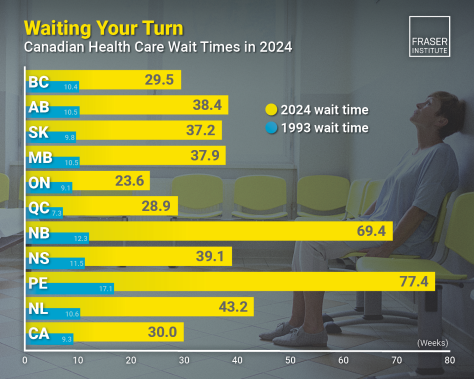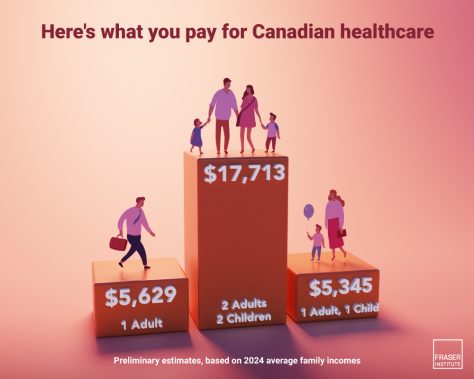I always get excited when the annual report on Canadian healthcare comes out. A lot of people in my office love single payer healthcare. Except they don’t know how it works in countries that have tried it. They imagine that it works well. They love the idea that healthcare will be free for them. But when I get my hands on a good study, it means a lot of fools are about to get a beat down.

Here’s the latest from the Fraser Institute:
-
In 2024, physicians across Canada reported a median wait time of 30.0 weeks between a referral from a GP and receipt of treatment. Up from 27.7 in 2023.
-
This is 222% longer than the 9.3 week wait Canadian patients could expect in 1993.
- The national 30 week total wait is comprised of two segments. Referral by a GP to consultation with a specialist: 15.0 weeks. Consultation with a specialist to receipt of treatment: 15.0 weeks.
-
After seeing a specialist, Canadian patients waited 6.3 weeks longer than what physicians consider to be clinically reasonable (8.6 weeks).
- Across 10 provinces, the study estimated that patients in Canada were waiting for 1.5 million procedures in 2024.
-
Patients also suffered considerable delays for diagnostic technology: 8.1 weeks for CT scans, 16.2 weeks for MRI scans, and 5.2 weeks for Ultrasound.
Well, there’s a saying in business. You can have a product or a service fast, or you can have it good, or you can have it cheap. Pick two out of 3. So, Maybe Canadian healthcare is not fast, but maybe it’s good, and maybe it’s cheap.

Let’s turn to the Fraser Institute again:
-
Canadians often misunderstand the true cost of our public health care system. This occurs partly because Canadians do not incur direct expenses for their use of health care, and partly because Canadians cannot readily determine the value of their contribution to public health care insurance.
-
In 2024, preliminary estimates suggest the average payment for public health care insurance ranges from $4,908 to $17,713 for six common Canadian family types, depending on the type of family.
-
Between 1997 and 2024, the cost of public health care insurance for the average Canadian family increased 2.2 times as fast as the cost of food, 1.7 times as fast as the average income, and 1.6 times as fast as the cost of shelter. It also increased much more rapidly than the cost of clothing, which has been falling in recent years.
OK, so Canadians aren’t getting healthcare fast, and they’re not getting healthcare cheap. Maybe they’re getting really really good healthcare, though.
Here are the numbers from a recent study from Ipsos, a major Canadian pollster:
An Ipsos survey for the Montreal Economic Institute is showing that Canadians’ opinions about their provincial healthcare systems have not improved in 2024 compared to last year. As in 2023, we find that less than half (48%) of Canadians are satisfied with their provincial healthcare system, with only 8% saying they are very satisfied. This proportion is even lower among women (43%), as well as residents of the Atlantic (30%).
Well, they are getting garbage healthcare. And they are not actually paying for healthcare. They are paying massive amounts of taxes for access to a waiting list for healthcare. And they get in line behind refugees who cannot even speak English, and have paid nothing in taxes. That’s what happens when you have universal-coverage government-run healthcare. That’s how it actually works in real life.
And sometimes they even die while waiting for healthcare. Here is an article from the Toronto Sun from January 2025:
Close to 15,500 people died waiting for health care in Canada between April 1, 2023 until March 31, 2024, according to data compiled by SecondStreet.org via Freedom to Information Act requests across the country.
However, SecondStreet.org says the exact number of 15,474 is incomplete as Quebec, Alberta, Newfoundland and Labrador don’t track the problem and Saskatchewan and Nova Scotia only provided data on patients who died while waiting for surgeries – not diagnostic scans.
SecondStreet.org says if it extrapolates the unknown data, then an estimated 28,077 patients died last year on health care waiting lists covering everything from cancer treatment and heart operations to cataract surgery and MRI scans.
I know that a some Americans like to pick political leaders and policies based on their feelings. They want to feel good. They want to be liked. People who like government-run healthcare tend to be people with enormous student loan balances for worthless non-STEM degrees. They work in easy jobs in the public sector. They join labor unions because they’re scared of competition and accountability. Many of them work in daycare or they teach little children, because they don’t want to be challenged by adults. When you look at the numbers on healthcare in different countries, it’s very clear what works and what doesn’t work. Americans need to be smarter than Canadians. We have to vote based on reason and evidence.








